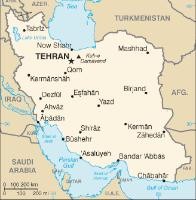Reuters is reporting that Iran has allowed its banks to issue debt instruments in foreign currencies. While the report describes the move as a way of attracting foreign investment capital to make up for reduced oil revenue, it also portrays the Iranian central bank’s attitude as pretty nonchalant about the whole matter. The emerging consensus on Iran, Russia and Venezuela is that falling oil prices are going to limit their ability to realize their ambitious troublemaking agendas in their respective parts of the world. That’s very likely. And to the extent that Ahmadinejad and Chavez used their oil revenue to […]
Iran Archive
Free Newsletter
In the National Interest, Nikolas Gvosdev suggests that in order to avoid the kind of infighting that led to the paralysis of the Carter administration’s foreign policy, President-elect Obama should task his national security team based on their constituencies, and then manage them properly to keep them out of each other’s lanes. It makes sense, but there’s one thing that’s always escaped me about the “Carter paralysis” analogy: Given the hand he was dealt in terms of the post-Watergate institutional crisis of the presidency, and the post-Vietnam crisis of American global influence, not to mention the domestic faultlines and divisiveness […]
Given that President-elect Barack Obama campaigned and won on a platform of engaging Iran diplomatically, the question now becomes not only how, but when. The timing is complicated, as Blake Hounshell of FP Passport points out, because of Iran’s upcoming presidential election, with some analysts (Brookings and CFR in a joint report) urging immediate steps, and others (CEIP’s Karim Sadjadpour) cautioning against giving Iranian President Mahmoud Ahmadinejad’s hardline foriegn policy a diplomatic victory to run on. Foreign Policy Watch’s MDC argues that current circumstances — including Obama’s popularity in Europe — provide America with a strong bargaining position, and has […]

When formulating a practical and forward looking policy towards Iran, which marks the 30th anniversary of its Islamic revolution this February, the Obama administration would do well to heed certain realities. Thirty years of muscular posturing by five successive administrations have not afforded the White House a handle on the Islamic Republic. Neither have they ushered in a new dawn of Middle Eastern stability or, for that matter, Israeli security. Instead, the United States must lead the way in establishing a strategic partnership with the Islamic Republic of Iran, in the context of a more engaged foreign policy. Iran is […]
